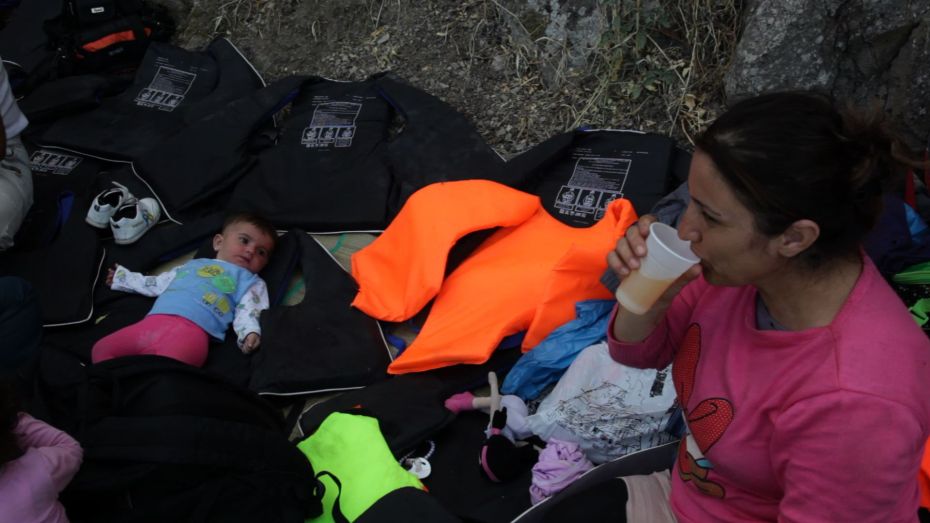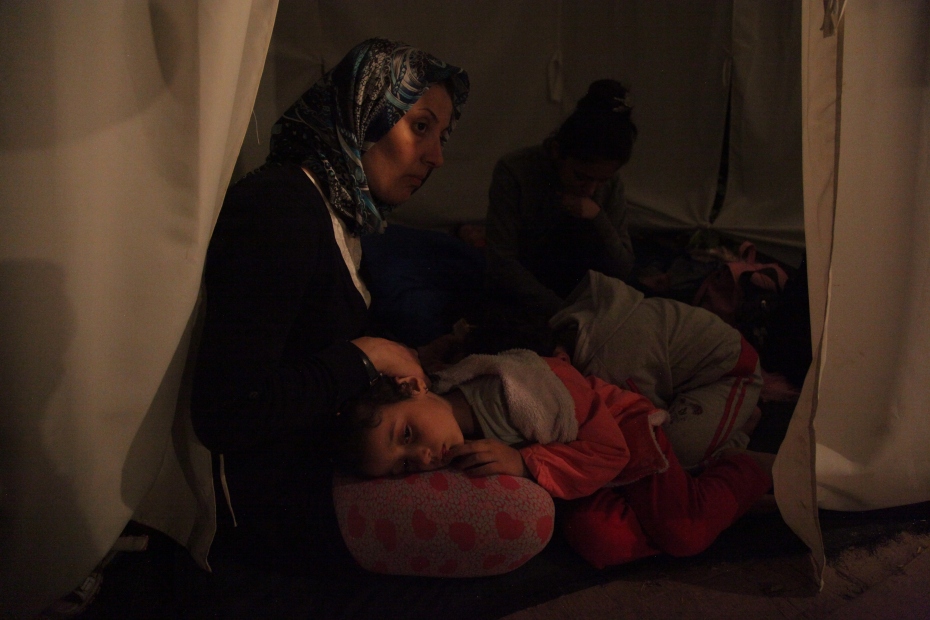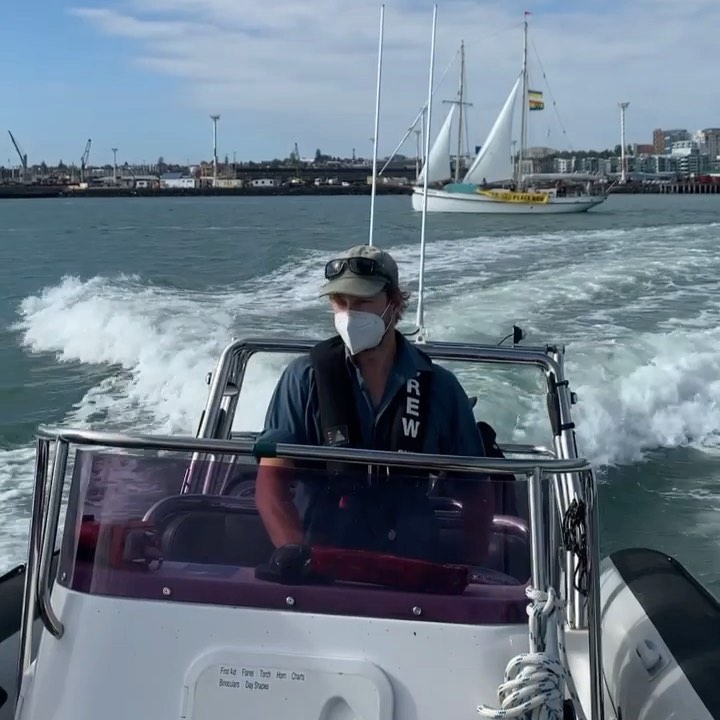“We have the right to get that paper!”
Originally Posted: 4 April, 2016. Filmmaker Sharron Ward writes on her troubling experience filming hundreds of refugees who washed ashore on the Greek island of Lesvos during the Summer of 2015. Syrian and other refugees and migrants leave the hell of war in the Middle East to arrive in what they think is paradise on the shores of Europe – but instead they find a new kind of purgatory.
“We have the right to get that paper, my dear, we have the right!” Seven months pregnant, Syrian refugee Hasana implored. We were sitting in the dirt in a layby outside the small village of Sikiminia on the island of Lesvos.

An Afghan baby lies in the dirt of a layby with her family after arriving at a makeshift transit camp on the island of Lesvos in Greece. Hasana from Syria sits in a white hijab behind them. They all arrived from Turkey in an inflatable dinghy. As the refugees are undocumented arrivals until they walk 65 kms to the south of the island to register with the police, they are not allowed to pay for a taxi, a restuarant or a hotel. © Sharron Ward
It was quickly getting dark and Hasana, a Human Resources manager, her Accountant husband and her two young children sat perched upon the life jackets they had used in their perilous journey across the sea in a flimsy inflatable dinghy from Turkey. It was the only thing they had to sit on to protect them from the dirty gravel underneath.
Hasana told me that they used to live in the UAE city of Dubai, but they moved back to Damascus a few years ago to be with their family. Now with bombings “constantly everyday” in the capital of Syria, they had fled in fear for their lives. They had money and they wanted to get a hotel, to eat in the local restaurant and to go to the toilet. They hadn’t eaten for two days and Hasana was pregnant.
I felt ashamed and bowed my head as I tried to explain that because they were deemed “illegal immigrants” by the Greek authorities until they had received their papers, local Greeks on the island would not help them. The locals would refuse to serve them in their restaurants, they wouldn’t offer them a lift in their cars, they couldn’t take a local bus and they wouldn’t even be able to use the toilet. I had to explain to them that she and her young family would have to spend the night right there in the cold and the dirt with no blankets.
They wanted to take a taxi to get them to the south of the island only an hour’s drive away, where they could register and become “legal.” But they couldn’t even do that. Despite a recent amendment to the Greek law that allowed drivers to pick up unregistered “aliens” in order to take them to be registered, Greek taxi drivers and locals still refused to help, pleading ignorance to the change in the law.
I found myself in this bleak situation as I was filming Eric Kempson, the British expat and his family who were almost single-handedly helping the thousands of refugees and migrants who’d arrived bedraggled and broken onto their shores. We had come to this transit area as it was a second staging post for those who had landed close to the harbour of Skala Sykamineas.

Refugees just landed on the island of Lesvos in Greece walk a gruelling 7-15 kilometres in the intense heat to get to a makeshift transit camp in the town of Molyvos. © Sharron Ward
But to get there, the damp and exhausted Syrians, Afghans and Iraqis had to walk up a series of gruelling switchbacks on a steep uphill gradient for several kilometres under the intense blazing sun. New born babies, pregnant women and toddlers, the disabled and the elderly all had to walk or be carried by their families.
I watched as locals drove by complaining and screaming at the refugees for the litter in the layby, but never offered to help clean it up. They complained of the fires the Afghans built to keep warm as they slept on the side of the road, but never offered to give them any shelter so they didn’t have to start the fires in the first place.
Eric had driven in his battered 3 cylinder Daewoo to meet a small group of volunteers who had come from around the world to help. They were overrun by hundreds of people sitting forlornly in the dirt, they were all hungry, cold and tired and it was getting dark. There were no blankets or food, and so Eric had arrived to try to feed the masses and give out the few sleeping bags he had. But demand exceeded supply and desperate parents pushed forward begging for blankets for their children. It was a tense and febrile atmosphere. I found myself with Eric and another helper dishing out sleeping bags and cheese sandwiches to eager hands thrust out in the darkness.

A refugee sleeps in a layby on the island of Lesvos, Greece after arriving in an inflatable dinghy from Turkey. Until refugees and migrants are officially registered with Greek authorities 65kms away, they are deemed “illegal” and are not allowed to pay for a hotel, go to a restaurant or pay for a taxi or bus to get to the authorities to register. © Sharron Ward
Amongst the detritus of charred rocks and salty sea-soaked clothing strewn across the railings, a new-born baby lying in a makeshift cradle made out of a box started crying. An older Syrian woman arrived out of breath, red faced and in great distress urging me to take her pulse, she looked like she was about to collapse. She had walked up the terrible steep gradient and her daughter implored me to get a doctor, she told me she had low blood pressure. But there weren’t any doctors and no emergency paramedics would come. There were no aid agencies on this side of the island helping apart from Eric and a few volunteers. Again I felt at a loss to explain to her why.
Eric was fuming, as I had seen him most days, at the treatment of these people not only by the Greeks, but by what he called the European Union “System.” This, he felt was an entirely avoidable crisis. “These people have been forced to become refugees, we’ve taken away their dignity, we’ve made them sleep on dirty ground, to go to the toilet in the fields, we’re making them walk across the island in blistering heat for 3 days – and we’re in Europe – we’re supposed to be civilised for Christ sakes,” he fumed.

A baby lies on life jackets with her mother after arriving at a makeshift transit camp on the island of Lesvos in Greece. They arrived from Turkey in an inflatable dinghy. © Sharron Ward
It was here that I had met Hasana and her family. I sat in the dirt with her as I listened to her impassioned plea. She eloquently articulated everything that was wrong with the “System.” Under the Geneva Convention she was a legitimate refugee fleeing the war in Syria, her house was bombed and they had fled for their lives. She told me they had tried the legal route and applied for a Visa three times to Greece and Italy, but they had been rejected each time. So the “System” had forced her to take her unborn baby, her two young children and her husband in a dangerous journey across the sea in a flimsy boat, at the mercy of unscrupulous smugglers who didn’t care if they lived or died.

Belgian volunteer Kris Nolmans comforts an Afghan refugee after telling her that the local village has told them to shut down the car park that was serving as a makeshift transit camp. © Sharron Ward
Embarrassed to be seen in such filthy conditions, she didn’t want her photo to be taken or to be filmed, but she told me, “The countries tell us if you want refuge, just come to us and apply, just come to us and we will give you everything. But how can we come to you when you refuse us a Visa?” She summed up the catch-22 asylum seekers like her were in – they couldn’t apply for asylum in the country they wanted to go to, if they couldn’t get there in the first place. I met many Syrians on the island who told me they too had their Visa applications refused and so were forced to make the perilous journey across the sea.
“Why, why, they refuse us?” she cried. “And when we come to Greece they won’t let us get a taxi, they say you don’t have the legal papers, why? I’m pregnant, just take me anyway! Emotionally, I’m suffering too much,” she pleaded. “We are sitting here in this very bad situation,” looking around her, she gave a wry laugh, “for no reason, there is no reason for this!”
“They can make this situation better, if they just think about this and give us the Visa. There is no need for us to do anything illegal! Do you understand me, my dear?” she implored.
Yes, Hasana, I understand you only too well.
I had never felt more ashamed to be European.
You can watch Sharron Ward’s short film on the refugee boat crisis for Channel 4 News here.

Zozanna, a Syrian Kurdish refugee calms her child after being rescued from the sea as they tried to cross from Turkey. © Sharron Ward

A Syrian woman tries to comfort her crying child after being rescued from the sea by the Hellenic Coast Guard in Molyvos on the island of Lesvos in Greece. © Sharron Ward

















